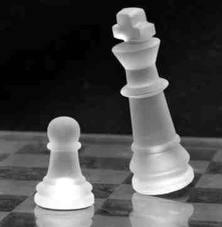
The "Simplest" Thing in Chess (Part Two)
If you read the first part of this article, then you already know that, despite popular belief to the contrary, King and pawn endgames can be very tricky. Even the most basic position, with just one pawn on the board, is impossible to play well if you don't know certain rules. Judging by your comments and attempts to solve the position I gave you last week, many of you are not familiar with these rules. I think we need to discuss it now before we proceed to more complicated endgames.
When you have King and a pawn vs. a lonely King, most of chess players are tempted to push the pawn forward and leave the King behind. Don't! The simple rule is you keep your King in front of the pawn until the King reaches the 6th rank (3rd rank for Black). Only then you can start moving the pawn. And of course you should know about the most important thing in this kind of an endgame: opposition. The next key position is a mutual zugzwang: if White moves, then it is a draw, if Black moves, he loses:
This is the simplest example of opposition when the Kings face each other on a file or a rank and there is just one square between them. Whoever moves, loses the opposition - which leads to bad consequences.
In the next example, a pawn is in front of White King and therefore it is a draw. Please pay attention to how Black constantly wins the opposition:
And here is how White wins if his King is in front of his pawn. Please notice how White gains space with his King before pushing the pawn.
If you are seeing this method for the first time, please take time to replay the above positions numerous times until you know them by heart; otherwise the solution to the position that I gave you last week will continue to seem confusing.
Now if the basic King and pawn endgames are so tricky, just imagine how complicated are more advanced endgames! It is a good opportunity to examine one of the most dramatic endgames I've ever seen. The game is Aronin - Smyslov and it was played in the Soviet Championship 1951. Today Lev Aronin is mostly unknown to the chess public, but at that point he was part of Soviet elite. Despite being only a Master, he tied for the second place in the Soviet Championship 1950 and in this championship, young Master Aronin was about to qualify to the Interzonal tournament which opens the path to the GM title and allows one to participate in the World Championship cycle.
All he needed to do was win with a completely winning position against Vassily Smyslov in the last round. It shouldn't be that difficult considering that the game was adjourned. (For younger readers I want to explain that in older times the game would be temporarily stopped after move 40 in order to resume it later, usually in two or three days.) So, Aronin could analyze the position as much as he wanted and ask for help any of his chess friends (it was absolutely legal when the game was adjourned!). What happened between the time when the game was adjourned and the time it was resumed is a stuff of legend. It was said that since the position was so clearly and easily winning for him, Aronin didn't analyze it at all and preferred to celebrate with friends in a restaurant. And precisely due to the same reason, Smyslov didn't want to resume the game and was about to resign it. Then he had the following conversation with his wife:
- You don't resign this game, Vassily! You should fight!
- But the position is absolutely hopeless!
- I am telling you, go and play!
Smyslov didn't have a choice, so the game was resumed and Smyslov made a draw! Immediately after the game was over, Smyslov called his wife and said: "Congratulations Nadya! You understand endgames better than me!"
Frankly speaking, I am not sure if this is exactly what happened, but it is a part of the Russian chess folklore. However the indisputable fact is that after the tournament Aronin got some serious health problems and was never even close to his previous level of play. Here is the fateful ending:
Personally I feel very sorry for Aronin since his whole chess career was effectively ruined by one careless decision. So let it be a reminder to all of us how tricky pawn endgames can be!
to be continued....






